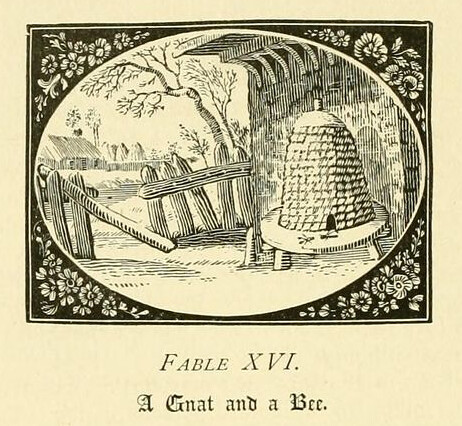HODIE: ante diem septimum Idus Novembres (and yes, you can have your own Roman Google Calendar).
VERBUM HODIERNUM: Today's word is MAGNUS - read a brief essay about the word at the Verbosum blog. Here's one of the sayings you can find in the essay: Ex minimis initiis magna, "From very small beginnings, great things."
FABULAE FACILES: The new easy-to-read fable is Simiae Saltantes, the story of some easily distracted monkeys.
MILLE FABULAE: I keep adding new illustrated fables to the Mille Fabulae blog every day. This is also where you can download your free PDF copy of the Mille Fabulae et Una book. Check out the new fables every day at the English Aesop blog, too.
TODAY'S MOTTOES & PROVERBS: Widgets available at SchoolhouseWidgets.com.
3-Word Mottoes: Today's 3-word motto is Quae prosunt sequor (English: I pursue things that are useful).
3-Word Proverbs: Today's 3-word proverb is Graculus graculo assidet (English: One jackdaw stands by another - something like "birds of a feather flock together").
Rhyming Proverbs: Today's proverb with rhyme is: Deficit ambobus, qui vult servire duobus (English: Someone who wants to serve two masters fails them both).
Vulgate Verse: Today's verse is Futura tempora oblivione cuncta pariter obruent (Ecc. 2:16). For a translation, check out the polyglot Bible, in English, Hebrew, Latin and Greek, at the Sacred Texts Archive online.
Elizabethan Proverb Commentary: Here is today's proverb commentary, this time by Conybeare: Culicem colant, camelum deglutientes: They streigne a gnatte through there teeth, and swallowe downe a cammelll. An apt proverbe applied by oure saviour Christ unto the Phariseis, which did aggravate small offences and mayntayne great enormities. It maye be nowe used agaynst such persons as seke out and punishe small offenders, and leat the great trespassours agaynst the lawe goe quyte unpunished. Also them that are scrupulouse yn thinges of litle importaunce, and yn ambition, avarice, extorcion, advonterie, theft, murder, treason or heresie they fynde no daunger of conscience.
Today's Poem: Today's poem is from the rhyming couplets collected by Wegeler, with a word list at NoDictionaries.com:
Nec nimium taceas, nec verba superflua fundas:English: "Don't be overly silent, and don't spout unnecessary words, but rather keep to the middle way, where you will always go best."
Sed medium teneas, quo bene semper eas.
Today's image is for the educational fable about the gnat and the bees: 698. Culex et Apes. Culex, hiberno tempore, cum fame et frigore se periturum coniiceret, ad apium accessit alvearia, ab eis cibum et hospitium petens. Quae si ab eis fuisset consecutus, promittebat filios earum se artem musicam edocturum. Tunc quaedam apes, “At ego artem meam malo liberi mei discant, quae eos a famis et frigoris periculo eximere poterit.” (source)
